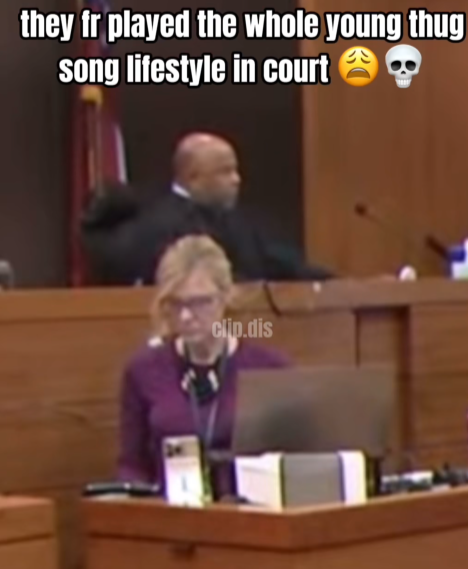“Courtroom ERUPTS After Judge Orders Young Thug’s ‘Lifestyle’ Played in Full — Everyone’s Reaction Says It All”
What started as a routine courtroom proceeding turned into one of the most surreal viral moments of the year when the judge allowed prosecutors to play Young Thug’s hit song “Lifestyle” in its entirety during trial. No one in the room — not the attorneys, not the reporters, and definitely not the public — expected a full rap track to echo through a solemn courtroom, but that’s exactly what happened.
The moment the speakers began to fill the room with the unmistakable melody, heads turned, eyebrows raised, and even the judge shifted in his seat with visible surprise. A court technician sat at her desk, looking both confused and determined as she queued up the audio, while attorneys tried to remain professional despite the bizarre atmosphere.
For several minutes, the courtroom transformed into something completely foreign — a place where a chart-topping rap song became evidence, dissected line by line. The prosecutors argued that certain lyrics provided “context” for the case, claiming that parts of the song reflected themes relevant to the ongoing charges. Defense attorneys, on the other hand, pushed back, insisting that using music as legal “proof” is misleading, prejudicial, and unfair.
Still, the judge allowed it. And once the track began, everyone was forced to sit through it. Every verse. Every ad-lib. Every line.
People in the gallery shifted uncomfortably. A few hid smiles behind their hands. Others looked stunned that something usually heard through headphones was suddenly booming in a room lined with state flags and law books. The energy was a strange blend of tension, awkwardness, and disbelief.
Observers described the moment as “the most unreal thing I’ve ever witnessed in court.” Even veteran legal reporters admitted they had never seen anything quite like it. One spectator later said, “It felt like watching two completely different worlds collide — the justice system and modern rap culture — and neither side knew how to handle it.”
From a legal perspective, the use of rap lyrics in trials has been debated for years. Critics argue that artistic expression shouldn’t be weaponized as evidence, especially when it risks painting defendants in a negative light based purely on creative storytelling. Supporters claim certain songs can provide insight into behaviors or affiliations. In this case, prosecutors leaned heavily on the latter argument.
But the viral moment wasn’t driven by legal nuance — it was driven by the sheer surrealism. People online reacted with disbelief, humor, and criticism, flooding social media feeds with clips, memes, and commentary. Many said the scene felt like something from a movie, not a real courtroom.
Regardless of opinions, the event will likely be remembered as one of the most unusual moments in modern trial history. The sight of a judge sitting at the bench while a rap anthem played in full volume will remain etched in the minds of everyone who was present.
The trial continues — but the courtroom soundtrack moment has already become legendary.
